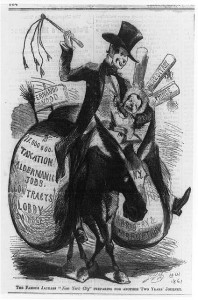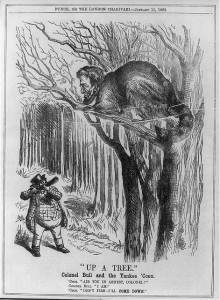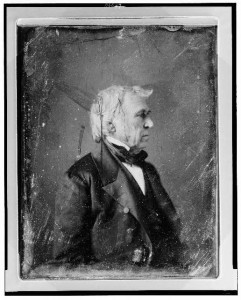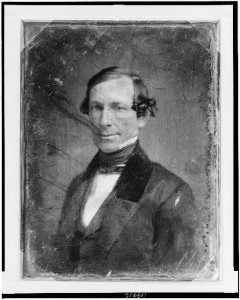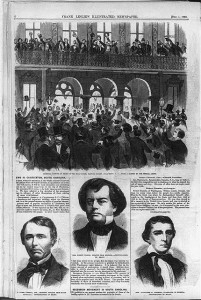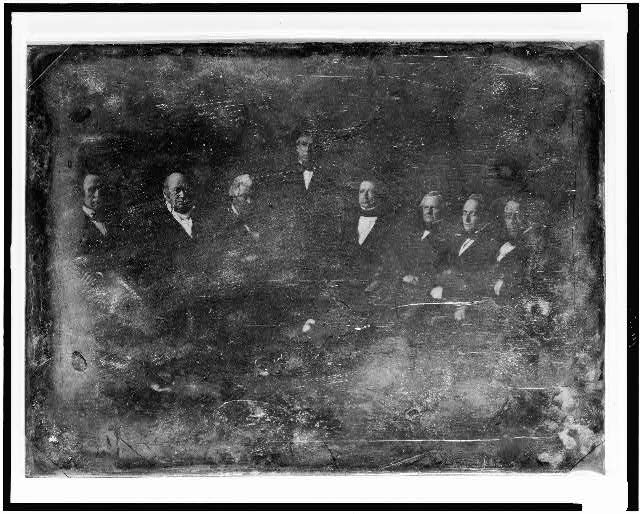Democrats throughout the North had a good deal of success in the 1862 midterm elections. The Democrats picked up 28 seats in the U.S. House of Representatives (although Republicans were still able to control the House thanks to the support of 25 Unionists). One new Democrat representative was New York City mayor Fernando Wood. In an editorial 150 years ago this week the Republican-leaning New York Times seems to be concerned that the wily Wood might get the best of “Honest Abe” and influence the president to compromise on his principles. After all, in January 1861 Mayor Wood had suggested to the Common Council that New york City should consider secedeing from the United States. In 1850 President Taylor had offered a good example of how to deal with disunionists.
From The New-York Times November 8, 1862:
Let the President Stand Firm.
Nobody who knows the vaulting audacity of the man FERNANDO WOOD, can doubt, now that he is elected, that he will make good his promise to his liegemen, to “go to the President and tell him that without we have a change of measures, so help me God! we will make a change of men.” The President may as well make up his mind at once to be soon bullied and brow-beaten in a style that he has never before seen or heard of; — that is to say, if he does not “put his foot down” at the first rampant word. Of course FERNANDO does not intend to operate slope. He will choose unto himself seven other spirits as presumptuous as himself, and with them he will assume to speak in the name of the triumphant Democratic Party. Not entirely without reason, either. Every reader of history understands that in revolutionary times. It is almost invariably the [b]oldest and the most violent who lead; and really if the Democratic Party, as revived, is to have any leadership in Washington, we know of nobody so likely to succeed to it as FERNANDO WOOD. At all events, whatever the power behind him, this man will attempt to use against the Presdent all the airs of authority and all the arts of intimidation, of which his long discipline in the democratic politics of this city — the most mephistophilian school extant — has made him the complete master.
With bald impertinence, if it [b]e offered, of course the President will know how to deal. But FERNANDO has acquired some knowledge of the usages of society, and will probably take care to phrase himself in a manner that shall secure him from being shown the door. Notwithstanding the coarseness of his manifesto here, he will, most likely, when it comes to the [c]ase in hand, make a special effort to pitch his dictation in as respectful a key as possible. We trust, however, that the President will abide dictation from FERNANDO WOOD in no way. He should meet the very first approach to it peremptorily, with the same spirit as that with which his predecessor. Old ZACHARY TAYLOR, silenced a correspondent, and, in many respects, a counterpart of this same WOOD, ROBERT TOOMES, when engaged on a similar errand. Of course, it is fit for the President to receive suggestions, and even advice, from any intelligent citizen, whether in or out of public life. But he degrades himself and his high office, if he endures the first word of either behest or menace, from any quarter whatsoever.
Unquestionably, in consequence of the late elections, every influence, proper and improper will be brought to bear upon President LINCOLN to obtain his committal to some compromising policy. Let him see to it that he stands firm. The determination he has so often expressed to uphold the Federal authority in all its breadth must be kept to unflinchingly. Nothing is so demoralizing as vascillation. Of all forms of weakness, this is the most mischievous –the one most sure to invite disasters and contempt. Human nature looks with involuntary respect, and a certain fear, upon those who choose their course with clear and deliberate foresight, and pursue it, when chosen, with unswerving resolution; who form their decisions cautiously and considerately, but refuse to reconsider them in difficult conjunctures, or to abandon them before unforeseen obstacles. There is an instinctive feeling that such men have within them the qualities which command success. They challenge confidence and support in advance. The President has been crossed in a way he hardly looked for — has experienced a defection that may well occasion anxiety; but there must be no irresolution that sways backward and forward with the fortunes of the day; no undervaluing for a moment of the great cause of the Constitution to which he has, committed himself; no misgiving lest right, if he sustains it faithfully, should, in the end, not triumph. The President has no alternative but to go straight on, consistently and persistently, to the end. It was long ago decided that the rebels, of their own motive, had cut short all forbearance and blocked up all accommodation. The whole guilt of this conflict rests with them; and not for an instant can the Government falter until its authority is vindicated, and the submission complete.
The legitimate influence of the late elections is directly the reverse of what the FERNANDO WOOD type of politicians will endeavor to make it. Instead of encouraging conciliation, it urges intenser hostility. It is not the olive branch the people mean, but the more trenchant sword. The loyal States are more impatient this day than ever for swift, sweeping war — the summary extermination of the rebellion by terrific battle. If President LINCOLN will only see that this cry is answered, the great-souled people will stand by him more devotedly than ever; and the insolent pack which now threatens him will make haste to hide their heads.
The Times might be spinning the election results a bit. Most Northeners would probably like the war to be over as soon as possible, but Democrats might be opposed to a vigorous prosecution that involved more martial law arrests and suspension of habeas corpus. – not to mention abolition.
The Aztec Club biography of Zachary Taylor alludes to the meeting with Toombs. In 1850 Taylor urged the admission of California and New Mexico as free states. Alexander Stephens led a filibuster in the U.S. House of Representatives to prevent a vote on California’s admission.
In April, delegates from a Southern caucus called upon the President to warn him of the loss of Southern Whig support if he persisted on his plan to admit California and New Mexico as states and continued his hostile attitude toward Texas. Stephens and Robert Toombs called on him in July, as they had earlier, and threatened secession. Taylor was obstinate …
In describing the political cartoon showing President Lincoln as a treed raccoon History Gallery points out the wisdom of Lincoln’s diplomatic response to the Mason and Slidell affair with Britain.

